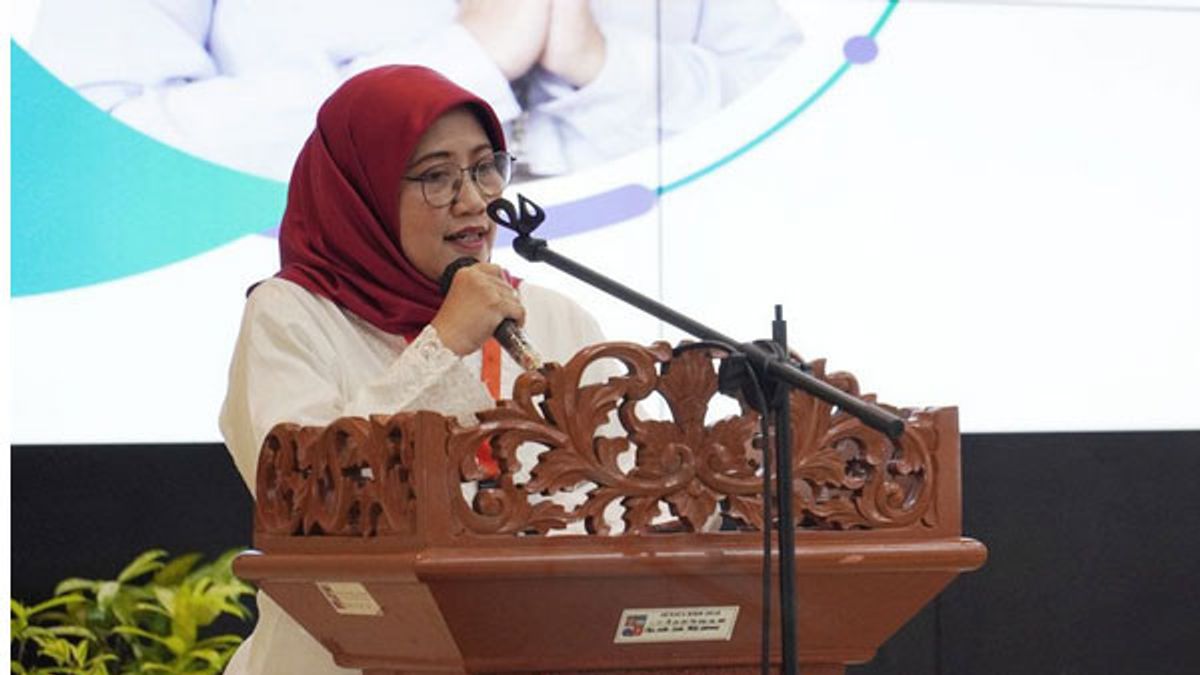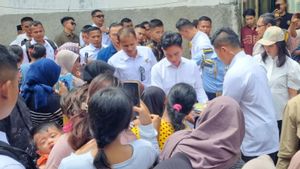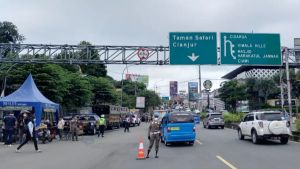BOGOR - The Bogor City Health Office (Dinkes) continues to strengthen the national health system by optimizing the role of integrated service posts (Posyandu) in stunting prevention within 2024.
Head of the Health Office Sri Nowo Retno said this was in accordance with the instructions of the Ministry of Health in determining six pillars of health transformation.
"Starting from the transformation of primary health services, transformation of referral health services, transformation of health resilience systems, transformation of health financing systems, transformation of health human resources, and transformation of health technology," said Retno in his statement, Monday, October 21.
Retno detailed that the first pillar of Indonesia's health transformation is the transformation of primary health services, its implementation focuses on increasing promotive and preventive activities to encourage more people to become healthier, improve health screening, and increase primary service capacity.
Its implementation can be explained as Population education, by strengthening the role of cadres, campaigning, and building movements, using digital platforms and community leaders.
Furthermore, Primary Prevention is carried out by increasing routine immunization to 14 antigens and expanding coverage throughout Indonesia.
"Securer Prevention, by screening 14 of the highest causes of death in each target age, screening, stunting, and increasing Antennatal Care (ANC) for the health of mothers and babies," said Retno.
Increasing the Capacity and Capability of Primary Services, by revitalizing networks and standardizing services at Puskesmas, Posyandu, and Home visits.
Primary Service Integration (ILP) is implemented by focusing on three things, namely life cycle services as a focus on health service integration, health service approaches through networks to the village and hamlet levels, as well as strengthening Local Area Monitoring (PWS). One of the changes in health services that occurred during the ILP era was the Posyandu service.
Retno said, Bogor City has 25 Puskesmas and 31 auxiliary health centers (Pustu) that have implemented ILP, there are also 983 posyandu with 7,791 cadres spread across six sub-districts and 68 sub-districts.
Posyandu as a Village or Kelurahan Community Institution managed and organized by the community, in the ILP era was carried out at least by five health cadres accompanied by health workers, where the services were integrated for all ages (life cycles) ranging from pregnant women, mothers. nifas, babies, toddlers, pre-school age children, adolescents, productive age to the elderly.
"Posyandu plays a role in stunting prevention by making prevention efforts and also handling them," said Retno
Stunting is a condition of growth disorders in children under five due to chronic malnutrition, especially during the First 1000 Days of Life (HPK). Another cause is poor parenting, eating and sanitation.
Stunting has an impact on the quality of human resources, which in turn will reduce the productivity of Human Resources so that demographic bonuses are not well utilized.
stunting data in Bogor City based on the 2023 Indonesian Health Survey (SKI), namely 18.2%, decreased by 0.5% from the previous year, which was 18.7%. The government has set a target for stunting prevalence to decrease by 14% by 2024.
The prevention strategy for accelerating stunting reduction in Bogor City is with the concept of prevention during the 1000 HPK period even since youth and brides-to-be as well as handling stunting toddlers, which are carried out by convergence of multi-sectors through specific and sensitive interventions in synergy, integrated, tiered manner through the Continuum of Care approach according to the life cycle.
In an effort to prevent stunting, posyandu cadres as extension workers and drivers of the community carry out education or counseling on Healthy Clean Life Behavior (PHBS), education on healthy environments and disease prevention, conducting health screening, detecting risk factors, mobilizing targets to be immunized and monitoring the provision of Blood Add Tablets (TTD) for young women, brides, and pregnant women.
Efforts to increase public knowledge through education can also be carried out by posyandu cadres together with health workers in the class of pregnant women, toddler classes, breastfeeding classes, or nutrition classes.
Meanwhile, in an effort to deal with stunting, posyandu cadres provide referrals for targets that are detected as malnourished to health workers, carry out periodic monitoring of nutritional problems targets that have been implemented or treated by health centers or hospitals, distribute and monitor the provision of supplementary food (PMT) for toddlers and pregnant women with nutritional problems.
In dealing with stunting, posyandu carries out routine services every month on Posyandu Open Day with 5 activities, for the target of pregnant women, toddlers, teenagers and brides-to-be, including:
One step registration. Two weight balancers, body length measurements, Upper Arm Circle measurements, blood pressure measurements.
Step three records by plotting the results of measurements to determine the nutritional status and health of the target.
Four steps for health services such as immunization, the provision of Blood Add Tablets, Vitamin A, worm medicine, validation of targeting malnutrition by health workers.
Five steps for counseling or education such as the consumption of balanced nutrition, Mother's Water Milk (ASI) and Mother's Water Supply Food (MP-ASI), referrals for pregnant women and nutrition problems toddlers, healthy lifestyles for adolescents and brides, environmental health education, and so on, according to conditions found in the target.
In Bogor City, Posyandu also carried out two additional steps, namely Step six and Step seven, which can be done both on Posyandu Open Day and outside the Posyandu Open Day, including:
The sixth step is to prevent stunting with sensitive interventions by sectors outside of health, such as the fulfillment of BPJS Social Security /JKN by the Social Service, Uninhabitable Homes (RTLH) by the Housing and Settlement Service, Family Development Risk Stunting by the Population Control Service and Family Planning.
Seven family resilience measures such as psychological counselor services from the Family Learning Center (Puspaga) from the Office of Women's Empowerment and Child Protection, fulfillment of community civil rights, population administration services from Disdukcapil, education on parenting and youth by Pokja 1 PKK, use of yards by the Food and Agriculture Security Service, and so on.
Apart from Opening Day of Posyandu, cadres also provide services to the target through house visits.
House visits are carried out to monitor overall health status, as well as as an effort to get an overview of the status of public health as a whole in the region.
Posyandu has a very important role in efforts to accelerate stunting reduction. The community is expected to be able to take advantage of posyandu services to create the Golden Generation in 2045.
The English, Chinese, Japanese, Arabic, and French versions are automatically generated by the AI. So there may still be inaccuracies in translating, please always see Indonesian as our main language. (system supported by DigitalSiber.id)











